- Home
- Kate DiCamillo
Where Are You Going, Baby Lincoln?
Where Are You Going, Baby Lincoln? Read online
Contents
Chapter One
Chapter Two
Chapter Three
Chapter Four
Chapter Five
Chapter Six
Chapter Seven
Chapter Eight
Chapter Nine
Coda
Baby Lincoln was dreaming.
In the dream, she was sitting on a train. Her hands were folded in her lap. The seat beside her was empty. Baby turned her head and looked out the window and saw that the dark sky was filled with stars, hundreds of them, thousands of them.
The train was going very fast, and the stars were falling through the sky, one after the other, chasing each other, leaving behind them great trails of light.
“Oh,” said Baby, “shooting stars.”
The train rushed through the starry darkness and Baby was entirely happy. I wonder where I am headed, she thought. I cannot wait to find out. I am on a necessary journey.
“Baby!” someone shouted. “You must wake up immediately!”
Baby woke up.
Her sister, Eugenia, was standing over her.
Eugenia had her hands on her hips.
“It is late, Baby. It is time to get on with our day,” said Eugenia. “Goals must be set. Lists must be made. Tasks must be accomplished.”
“Yes, Sister,” said Baby.
At the breakfast table, Eugenia had Baby write down the day’s goals.
Eugenia was very fond of goals.
“Goal number one,” said Eugenia. She cleared her throat. “The mouse problem must be dealt with. We are on the verge of an infestation. You, Baby, will go to Clyde’s Bait, Feed, Tackle, and Animal Necessities and purchase mousetraps.”
“But mousetraps kill mice,” said Baby.
“Exactly,” said Eugenia.
“Oh, Sister,” said Baby.
“Do not ‘Oh, Sister’ me. You are too soft for this world, Baby. You must be firm and resolute, particularly with mice. You must brook them no quarter.”
Baby suddenly felt very tired.
She put her hands in her lap. She closed her eyes and saw the shooting stars from her dream. She remembered the words that had accompanied the stars. “Necessary journey,” whispered Baby.
“Write it down,” said Eugenia. “Write down mousetraps.”
Baby sighed. She opened her eyes and picked up her pencil and wrote down the word mouse.
Eugenia looked over her shoulder. “You have not written the complete word,” she said. “The complete word is mousetraps.”
From far away came the sound of a train whistle.
Eugenia tapped her finger on the table. “What are you waiting for, Baby? Write traps.”
The train whistle sounded again, closer this time.
“No,” said Baby. She laid down the pencil.
“I beg your pardon?” said Eugenia.
“No,” said Baby. “I will not write the word traps.” She pushed the paper away from her. She stood. She said, “Sister, I am going on a trip.”
“Yes,” said Eugenia. “You are. You are going to Clyde’s Bait, Feed, Tackle, and Animal Necessities, and once you are there you will purchase mousetraps.”
“No,” said Baby. “I am going on a different kind of trip.”
“A different kind of trip?” said Eugenia.
Baby closed her eyes, and again she saw the shooting stars. “I am going on a necessary journey.”
“I don’t know what you’re talking about,” said Eugenia.
Baby opened her eyes. She didn’t know exactly what she was talking about either. But she knew that something important was happening. Her heart was beating very fast.
The sun was shining into the kitchen, and everything seemed outlined in brightness, possibility.
Eugenia stared at Baby. Her mouth was open. She looked quite astonished.
Baby was astonished, too.
She carefully pushed her chair under the table. She smoothed the front of her skirt. “Now,” she said, “if you will excuse me, Sister, I must go and pack for my journey.”
Baby went into her bedroom and closed the door.
“What next?” she said out loud.
Well, the obvious thing was that she must pack a suitcase. That was what people did when they went on journeys.
Baby retrieved her suitcase from the top shelf of her closet and opened it. Several surprised and hopeful moths flew out of the emptiness.
Baby looked down at the open suitcase.
She wasn’t certain what to put in it.
She had no idea where she was going or how long she would be gone. Also, the last time she had packed a suitcase, Eugenia had been standing right next to her, telling her exactly what she must do and exactly how she must do it.
Baby thought for a while.
“A toothbrush,” she said out loud. “I will definitely need a toothbrush.”
She put her toothbrush in the suitcase. It looked lonely. She added a nightgown and reading glasses.
The reading glasses made Baby realize that she should bring along something to read.
She put her current library book into the suitcase. The book was a mystery entitled The Inimitable Spigot. Detective Henrik Spigot was a man with a mustache who was always telling other people what they should do and how they should do it. He was very judgmental. He was extremely certain.
Baby thought that Detective Spigot bore a strong resemblance to Eugenia. Except for the mustache, of course.
Baby was on page 23 of the book and so far she didn’t think that Spigot was particularly inimitable.
She looked down at the book and her toothbrush and her nightgown. She added a sweater to the suitcase and then she closed the lid and snapped the buckles shut. The buckles were made of brass, and they made a lovely, definitive, necessary-journey kind of sound.
There was a knock at the door.
“Baby?” said Eugenia.
Baby opened the door. “Yes, Sister?” she said.
“I would like to ask you some questions about your journey,” said Eugenia.
“All right,” said Baby.
“Where are you going?” said Eugenia.
“I’m not certain,” said Baby.
“Why are you going?” said Eugenia.
“I cannot say,” said Baby.
“Stop this nonsense,” said Eugenia.
“I will not stop,” said Baby. She picked up her suitcase.
General Washington, who was Eugenia’s cat, came slinking around the corner. He twined himself through Baby’s legs so aggressively that she felt as if she might lose her balance.
“Moooowwwwwwwlllllllll,” said General Washington.
“General Washington is asking you not to go,” said Eugenia in a somewhat subdued tone. “He is saying that he would like you to stay.”
“What about you, Sister?” said Baby. “Would you like me to stay?” Baby knew, suddenly, that if Eugenia said the right words, she might put down her suitcase. She might stay.
Eugenia cleared her throat. She made a harrump-ish sort of noise. And then she straightened her shoulders.
“Far be it from me to tell you what to do,” said Eugenia.
These were not the right words.
Baby tightened her grip on her suitcase. “If you will excuse me, Sister, I must leave now,” said Baby. “It is necessary.” She walked past Eugenia and General Washington.
Baby walked out the front door and down the front path and onto Deckawoo Drive. She took a right.
The suitcase was not heavy at all.
The sun was shining, and Baby’s heart felt like a hummingbird in her chest. It was whirring. She could feel the flutter of its tiny wings.
>
She walked quickly. She did not look behind her. She was worried that Eugenia might be following her.
She was also a tiny bit hopeful that Eugenia might be following her.
When Baby was almost at the end of the block, she heard someone call her name.
“Baby! Baby Lincoln, wait for me!”
Baby stopped. She turned around.
Stella, who lived next door to the Lincolns, was running toward her.
“Where are you going, Baby Lincoln?” said Stella.
Baby stood up straighter. She said, “Hello, Stella. I am going on a necessary journey.”
“Oh,” said Stella, “I like journeys. I have taken lots of journeys, but I’m not sure I’ve ever been on a necessary journey. Most of my journeys have been family journeys, and that means we all go together in the car and my mother drives, and my father sleeps, and Frank navigates. When we are on family journeys, we eat in restaurants, and I always order a hot dog and Frank doesn’t order anything at all because he brings a supply of peanut butter sandwiches with him. He says that the peanut butter sandwich is infallible. Do you like peanut butter, Baby Lincoln?”
“I do like peanut butter,” said Baby.
She felt a little niggle of worry. She realized that she had not packed anything to eat. She moved her suitcase from one hand to the other. She felt The Inimitable Spigot slide around in the near emptiness.
“The thing about our journeys,” said Stella, “is that Frank is always the navigator. Always. I would like to hold the map sometimes. I would like to navigate. But I never get to.”
“I understand,” said Baby. “Eugenia will never allow me to hold the map either.”
“Do you have a map?” said Stella. “We could look at it together.”
“I do not have a map,” said Baby. She felt another ping of worry.
“Well, where are you going?” said Stella.
“Right now?” said Baby.
“Right now,” said Stella.
“I am headed to the train station,” said Baby.
“I will walk with you,” said Stella. She put her hand in Baby’s hand. “Okay?”
“That would be lovely,” said Baby.
At the train station, the ticket seller said, “Headed where?”
Stella said, “Her name is Baby Lincoln, and she is on a necessary journey.”
“Uh-huh,” said the ticket seller. “Headed where?”
“I’m not entirely certain,” said Baby.
The ticket seller was holding a cheese sandwich in both hands. His name tag said LAWRENCE.
Lawrence looked at Baby. He looked at Stella. He sighed. He put the sandwich down on the counter. The cheese inside the sandwich was orange and there were several thick slices of it. It looked delicious. Baby wished that she had thought to make herself a cheese sandwich before leaving home.
Lawrence reached out and picked up a leaflet from the display in front of him.
“Schedule,” he said, handing it to Baby. “Pick a destination.”
“Thank you very much,” said Baby.
“Let me see, let me see,” said Stella.
They stepped away from the ticket counter and Baby handed Stella the schedule.
“Ohhhh,” said Stella. “It’s a chart. I’m really good with math and charts. Last year, Mrs. Wilkinson said that I was a true math whiz. Has anybody ever called you a true math whiz, Baby Lincoln?”
“Not that I can recall,” said Baby.
Eugenia was the sister who had a head for figures. Or at least that was what Eugenia said.
Stella studied the schedule. “How much money do you have, Baby Lincoln? You can go to Calaband Darsh if you have enough money. Doesn’t Calaband Darsh sound like a good place to go?”
Calaband Darsh sounded like a very grand place, a shooting-star kind of place. Baby opened her purse and took out her wallet. She handed the wallet to Stella and watched as Stella counted the money inside.
“Okay,” said Stella. She handed the wallet back to Baby. She consulted the train schedule. “Let’s see.”
It turned out that Baby didn’t have enough money to get to Calaband Darsh.
She had enough money to get to Fluxom.
“Fluxom?” said Baby.
“Fluxom,” said Stella.
Fluxom did not sound like a shooting-star kind of place at all.
But Baby went bravely back to the ticket counter and spoke to Lawrence. She said, “One ticket for Fluxom, please.”
And after that, there was no turning back.
Baby boarded the train. Stella stood on the platform and waved good-bye.
The train lurched forward. Baby watched Stella get smaller and smaller until, finally, she disappeared altogether.
And then Baby Lincoln was alone, on a train, on a necessary journey.
“Seat taken?” said a man wearing a gigantic fur hat.
The hat was so enormous and so furry that at first glance, Baby mistook the man for a bear.
“It is not taken,” said Baby.
“Thank you very much,” said the man. He sat down next to Baby. “Head allergies,” he said. He pointed at his fur hat with an index finger. “I beg your pardon, but the hat must remain.”
“Certainly,” said Baby.
The man in the fur hat got out a newspaper. He skipped over the news and the sports and the opinions and went directly to the comics.
Eugenia said that the comics were a spectacular waste of time. Each morning, she removed them from the paper as a protest against their pointlessness.
The man in the fur hat followed each word of the comics with one enormous finger. He laughed softly as he read.
“Good for the head allergies,” the man said to Baby when he saw her staring at him.
“I beg your pardon?” said Baby.
“Laughing,” said the man. “Clears the sinuses and the soul in a very satisfying way.”
“I see,” said Baby. “Thank you.”
The man rustled the pages of the paper. He laughed some more. And then he folded the paper carefully and took out a handkerchief and blew his nose for what seemed like a very long time.
He turned to Baby. “Did you bring something to read?”
“I brought my library book,” said Baby. “It is a mystery entitled The Inimitable Spigot.”
“Is it funny?” said the man.
“It is not,” said Baby. “My sister, Eugenia, recommended it to me.”
“Would you care for a page of the comics?” said the man.
“Eugenia says that the comics are a spectacular waste of time.”
The man in the fur hat laughed very loudly. “Why, of course they are.” He slapped his knee. He laughed some more. “A spectacular waste of time! Absolutely! Yes. That is exactly what they are, bless them.” He sneezed. He took out his handkerchief and blew his nose. He chuckled.
And then he turned to Baby with a very serious look on his face. “You must read the comics,” he said. “I insist.” The man unfolded the paper and handed Baby a page of the comics.
To be polite, Baby took the page. She held it out in front of her and placed a finger under each word in the first comic, just as she had seen the man in the fur hat do.
She glanced over at him.
“That’s right,” he said. “Keep going.”
Baby looked at the pictures and read the words. In the first strip, there was a little man who had antennae on his head and who spoke in a strange language that resembled English just enough that Baby could make some sense of it. “Fozwhat mortak, I greet you!” said the man with the antennae. The picture showed him bending over, smiling at a bug on the sidewalk.
Baby read this and laughed. “Fozwhat mortak!” she said out loud.
“Yes!” said the man in the fur hat.
Baby went on to the next comic, which featured a squirrel that was able to fly and that was engaged in fighting evil. This strip was not quite as funny, but it was deeply satisfying in some ridiculous way. A squir
rel! Fighting evil! Baby smiled to herself as she read it.
“You see?” said the man in the fur hat.
“I do!” said Baby.
Baby read the comics. She laughed. The man in the fur hat sat beside her, blowing his nose, nodding and smiling. Outside the train window, the world rushed by in a blur of green and gold and brown.
And Baby was suddenly tremendously happy, just as she had been in her dream.
“Lower Loring!” shouted the conductor. “Lower Loring.”
“This is my stop,” said the man in the fur hat. He stood. He lifted the hat off his head and bowed to Baby. “It has been a pleasure, a delight, a revelation. It has been everything except a spectacular waste of time. Fozwhat mortak! I bid you safe travels. Tell your sister, Eugenia, that I send her greetings. Tell her to laugh.”
Baby doubted that she would deliver this message to Eugenia, but she did think that she might start reading the comics on a regular basis.
“Good-bye,” said Baby. “And thank you.”
The man put the fur hat back on his head and lumbered down the aisle.
He really did look very much like a bear.
Baby heard him sneeze before he exited the train.
Baby opened her suitcase and took out The Inimitable Spigot. She tried to read, but the book was not funny. Also, Henrik Spigot was annoying, and bossy. He thought he knew the answer to everything.
Baby closed the book and looked at the picture of Detective Spigot on the cover.
“No one knows the answer to everything,” Baby said to Detective Spigot.
He really did look a lot like Eugenia — minus the mustache, of course.
Baby wondered what Eugenia was doing. Was she at Clyde’s Bait, Feed, Tackle, and Animal Necessities? Was she purchasing mousetraps?
Did she miss Baby?
In answer to this last question, Baby heard Eugenia say, “Most certainly not!”
It was a very sad answer, even if it was an imaginary one.
Baby closed her eyes. She fell asleep.
When she woke up, a young woman was sitting beside her. The woman had long blond hair. There was a gigantic bag of jelly beans in her lap.

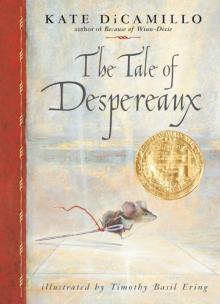 The Tale of Despereaux
The Tale of Despereaux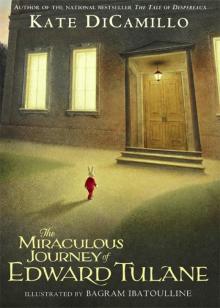 The Miraculous Journey of Edward Tulane
The Miraculous Journey of Edward Tulane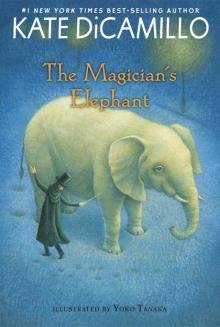 The Magician's Elephant
The Magician's Elephant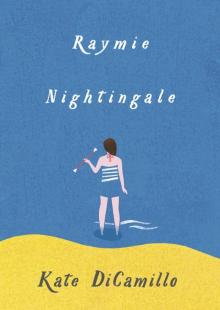 Raymie Nightingale
Raymie Nightingale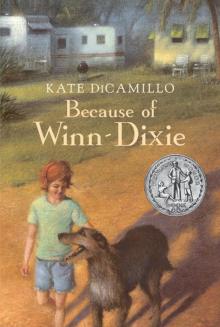 Because of Winn-Dixie
Because of Winn-Dixie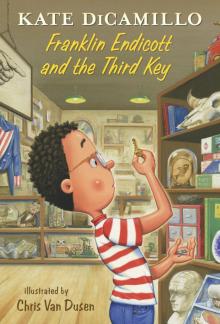 Franklin Endicott and the Third Key
Franklin Endicott and the Third Key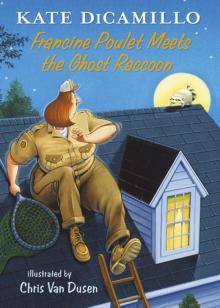 Francine Poulet Meets the Ghost Raccoon
Francine Poulet Meets the Ghost Raccoon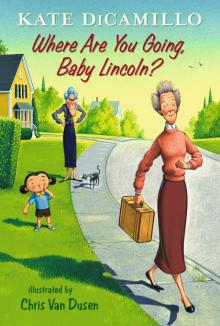 Where Are You Going, Baby Lincoln?
Where Are You Going, Baby Lincoln?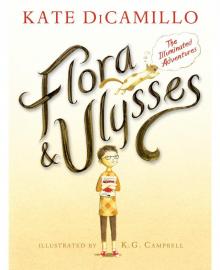 Flora & Ulysses: The Illuminated Adventures
Flora & Ulysses: The Illuminated Adventures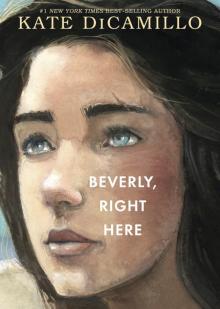 Beverly, Right Here
Beverly, Right Here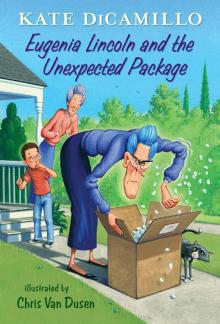 Eugenia Lincoln and the Unexpected Package
Eugenia Lincoln and the Unexpected Package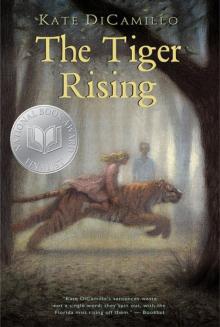 The Tiger Rising
The Tiger Rising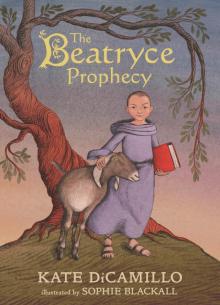 The Beatryce Prophecy
The Beatryce Prophecy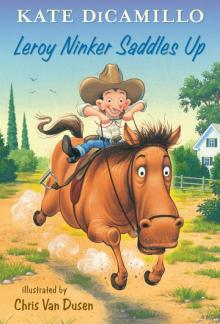 Leroy Ninker Saddles Up
Leroy Ninker Saddles Up